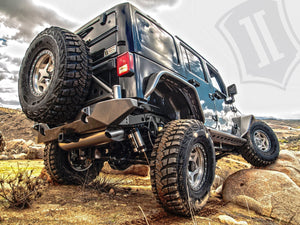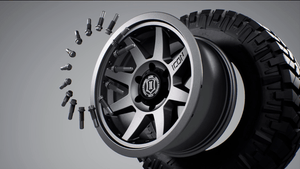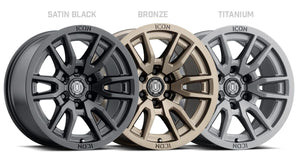
Tech Tidbit: Common Steel Groups for Axles
Typically, steel is rated by the SAE or the ASM according to its particular elements. Proven and standardized “recipes” are issued a four-digit number. The first two signify the steel group, i.e. carbon steel, nickel-chromium-molybdenum steel, etc. The second two indicate the carbon content in hundredths of a percent, which is variable according to end use.
10XX, 11XX, 12XX, 15XX = The carbon steel group. Most standard OEM axles are 1040 grade. OEM axles are generally heat treated to 40 Rockwell in the center with the outer layer at 55-60 Rockwell to a depth of about .180 inch. These grades all carry from 1.00-1.65% manganese. The industry differentiates these steels by their carbon content, i.e., “low carbon” and “high carbon” steels. The last two digits “XX” indicate the carbon content of the steel. A “30” indicates 3% carbon, “40” indicates 4% carbon, and so on.
13XX = This manganese steel group contains 1.45-2.05% manganese. If it contains 1.6-2.05% manganese, it can be called an alloy steel. This grade is used by aftermarket axle builders because the high manganese content allows for more flexibility during the heat treating process. Some 15XX steels have 1.6-2.05% manganese.
41XX, 43XX, 47XX, 86XX = The nickel chromium-molybdenum group. An alloy containing .65-.95% chromium, .2-.3% molybdenum and 1.55-2.0% nickel. Chromium increases hardness and the elastic limits (when the material is quenched), as well as increasing corrosion resistance. Molybdenum and nickel also increase hardness.
“H” Rated = There is a whole range of “H” rated steels that will match the composition of the standard type, such as 1340, but will contain a measure of silicon. Silicon comes from quartz and sand and when mixed into steel it adds a measure of hardness and can improve or increase the heat treating options. 1340H, for example, has .15-.30% silicon.
“M” Rated = These are modified steel, where the “recipe” of a rated steel has been given slight enhancements to improve or alter its characteristics. Two are commonly seen in the axle world, 1541M and 4340M (a.k.a., 300M).
Comparison of Steel Properties*
| SAE Grade | Tensile Strength | Yield Strength |
| 1040 | 120,000 psi | 106,000 psi |
| 1050 | 162,000 psi | 146,000 psi |
| 1541H | 181,000 psi | 164,000 psi |
| 4340 | 228,000 psi | 210,000 psi |
*Typical, as used in the actual product, including all heat treatments. Some specific recipes might be higher or lower. This represents an industry average.
Popular Resources:
Share Article:
No comments yet. Be the first to add comment!
Leave a comment
Your email address will not be published. Required fields are marked with *







